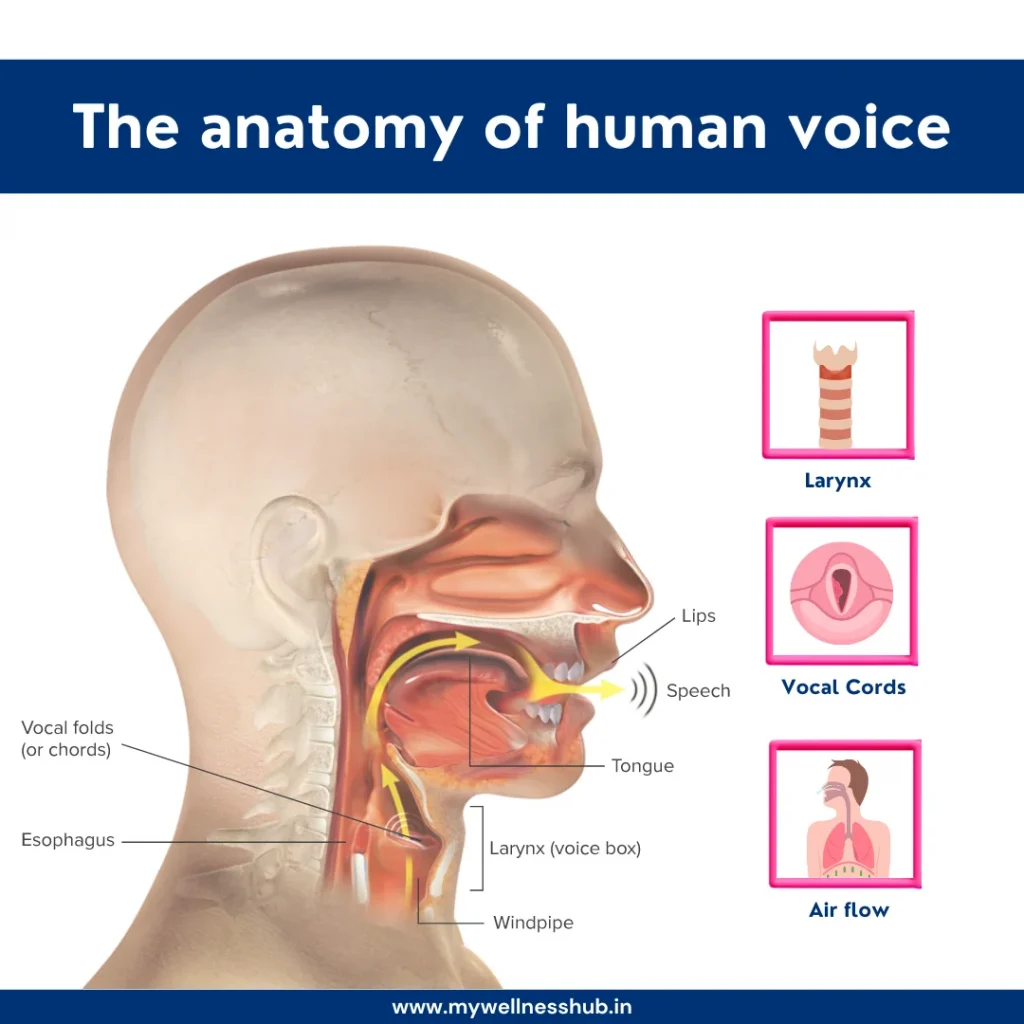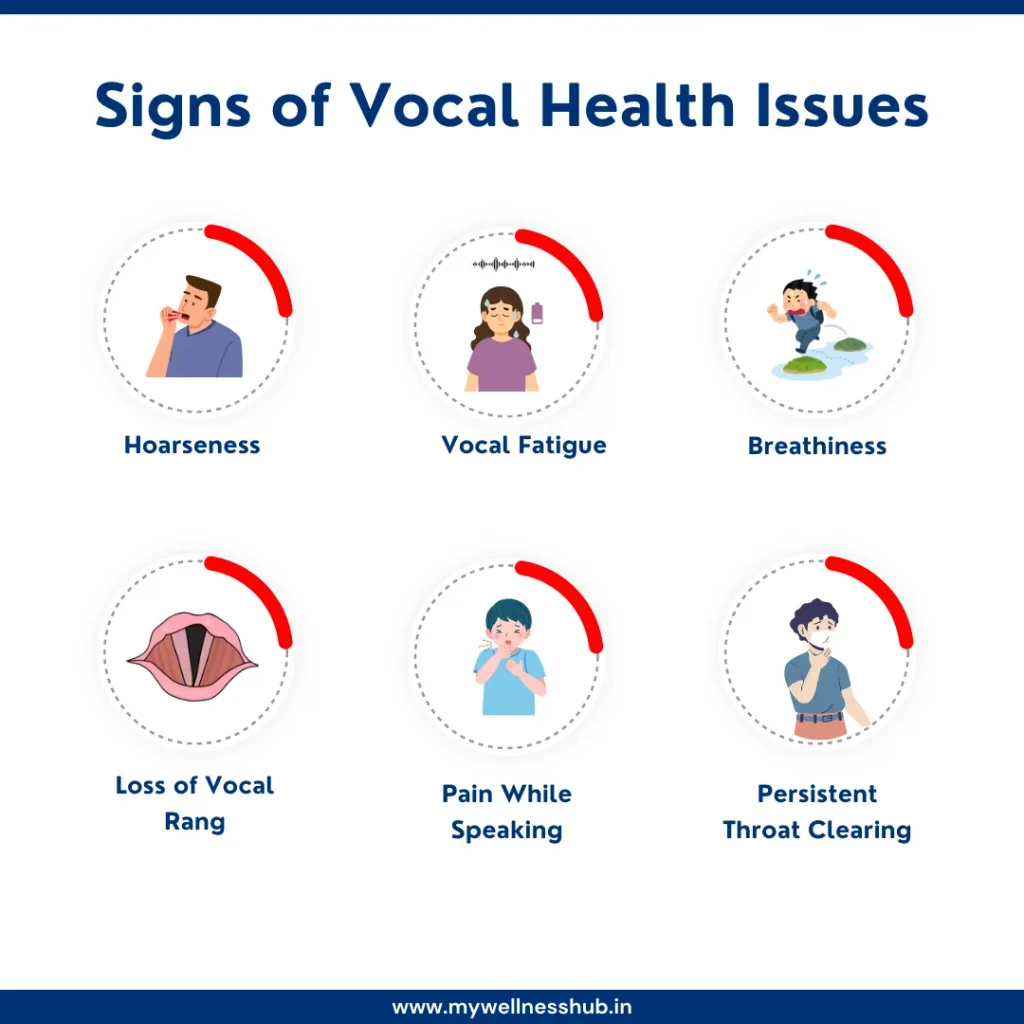Voice Care: Tips for a Healthy, Strong Voice
By Rajini D
Last Updated: August 1, 2024
Your voice is more than just a sound; it’s a critical tool that helps you communicate your thoughts, feelings, and knowledge to the world. Whether you’re a teacher delivering lessons, a singer hitting the high notes, or a public speaker inspiring a crowd, your voice plays a vital role in your professional and personal life. But have you ever considered how much you depend on your voice daily?
Maintaining vocal health is essential, especially for those who use their voice extensively. Ignoring the care of your vocal cords can lead to issues that might not only affect your ability to speak but also your overall well-being. In this article, we’ll explore some foundational steps you can take to keep your voice in prime condition, ensuring that you can continue to express yourself clearly and effectively, day in and day out.
Book Your Speech Therapy Session Now
Understanding Your Voice
What is Voice?

Have you ever wondered how you can whisper a secret, shout at a sports event, or sing your favorite song? It all comes down to your voice, a remarkable tool that allows you to express a spectrum of sounds. At its core, the voice is produced by the vibration of your vocal cords—two flexible bands of muscle tissue located in the larynx, or voice box. When you speak or sing, air from your lungs is pushed through the closed vocal cords, causing them to vibrate and produce sound. This sound then resonates in the spaces of your throat, mouth, and nose, shaping the unique sound of your voice. Understanding these voice care basics is the first step to maintaining a healthy, strong voice that can truly represent your emotions and thoughts.
Signs of Vocal Health Issues

So, how do you know when your voice is not healthy? Some common symptoms can signal that your vocal cords might be under strain or suffering from damage. Hoarseness, a sudden change in the tone that makes your voice sound breathy, scratchy, or husky, is a primary indicator. Another red flag is a loss of vocal range, particularly for singers, where hitting those high or low notes becomes a struggle. Vocal fatigue, where your voice tires easily, and you find speaking effortful, can also suggest that it’s time to pay more attention to your vocal health.
Recognizing these signs early can make a significant difference in how you care for your voice. By staying tuned to what your voice is telling you, you can take steps to prevent further issues and maintain its health and vitality.
Common Causes of Voice Problems
Everyday Activities That Impact Vocal Health
Did you know that your daily activities could be subtly undermining the health of your voice? Something as common as shouting to be heard over noise at a busy cafe or cheering loudly at a sports event can strain your vocal cords. Regularly speaking in noisy environments forces you to overuse your vocal muscles, which can lead to voice strain, a common issue for many.
Moreover, even your job might be a culprit if it requires you to talk for long periods without adequate rest, or to raise your voice frequently. Teachers, coaches, and call center agents often face these vocal health threats due to the nature of their work. Recognizing these activities as potential causes of voice strain and modifying how you use your voice can significantly help in maintaining vocal health.
Medical Conditions Affecting the Voice
While daily habits play a crucial role, several medical conditions can also influence your vocal health. For instance, gastroesophageal reflux disease (GERD), commonly known as acid reflux, can damage your vocal cords when stomach acid travels back up the esophagus. This not only causes discomfort but also can lead to significant voice issues over time.
Respiratory infections like the common cold or flu can also temporarily affect your voice, making it sound hoarse or weak. In some cases, more serious conditions such as thyroid disorders, neurological diseases, or even vocal cord paralysis could be the underlying cause of voice problems. If you’re experiencing persistent voice changes, it’s important to consult a healthcare professional to explore these potential medical causes of voice problems.
Proactive Voice Care Tips
Hydration and Diet
One of the simplest, yet most effective ways to take care of your voice is by staying well-hydrated. Drinking plenty of water keeps your vocal cords adequately moisturized and helps prevent the dryness that can lead to irritation and damage. Think of it this way: just as a well-oiled machine runs smoothly, well-hydrated vocal cords function better and are less prone to injury. What’s the best diet for vocal health? Alongside hydration, it’s wise to avoid foods and beverages that can irritate your throat, such as overly spicy foods, caffeine, and alcohol, especially before using your voice extensively.
Incorporating foods rich in hydration, like cucumbers, celery, and watermelon, can also benefit your vocal cords. Additionally, foods high in vitamins A, E, and C support mucous membranes, protecting your voice further. Remember, what you consume can significantly impact your vocal health, so choose wisely to keep your voice in top condition.
Foods to Embrace and Avoid for Vocal Health
| Foods to Embrace | Foods to Avoid |
|---|---|
| Water – Essential for hydration; keeps the vocal cords lubricated. | Spicy Foods – Can cause acid reflux, which may damage vocal cords. |
| Herbal Teas – Soothing, hydrating, and often anti-inflammatory. | Dairy Products – May increase mucus production, which can affect voice clarity. |
| Fresh Fruits and Vegetables – High in water content and vitamins that support mucous membrane health. | Caffeine – Can dehydrate, potentially drying out the vocal cords. |
| Honey – Helps soothe the throat and can coat the vocal cords gently. | Alcohol – Dehydrates and can swell the vocal cords, impairing voice quality. |
| Ginger – Known for its anti-inflammatory properties, beneficial for throat health. | Processed Snacks – High salt content can lead to dehydration. |
| Leafy Greens – Rich in vitamins that support overall health, including vocal health. | Acidic Foods – Like tomatoes and citrus fruits, may trigger reflux that harms the vocal cords. |
Also Read: Food affecting your stress in all the ways | know more how food affects your mood
Vocal Rest and Recovery
Just like any part of your body, your vocal cords need rest to recover from strain. If you’ve been using your voice a lot, incorporating vocal naps—periods where you don’t talk at all—can be incredibly beneficial. This is especially important after extended periods of speaking, singing, or shouting. How to rest your voice effectively? Schedule quiet times during the day, avoid whispering (which can strain the voice more than speaking softly), and ensure you get enough sleep at night to allow your vocal tissues to heal.
Vocal rest isn’t just about silence; it’s about giving your voice a break when it feels tired or strained. Listen to your body, and don’t push through vocal fatigue—this is when damage is more likely to occur.
Exercise and Vocal Hygiene
Maintaining good vocal hygiene isn’t just about avoiding the bad; it’s also about actively engaging in practices that enhance your vocal health. Regular vocal exercises can strengthen your voice and increase its endurance. For instance, simple breathing exercises that focus on diaphragmatic breathing can support your voice by ensuring you’re using air efficiently when you speak or sing.
Additionally, routine exercises such as humming or gentle lip trills can help keep your vocal cords flexible and responsive. Always start these exercises with a warm-up, just as you would before a physical workout, to prepare your voice for use and prevent strain. Tips to maintain a healthy voice include avoiding yelling and other harmful vocal habits, practicing good posture (which supports better breathing), and using a microphone when speaking in loud environments to avoid overstraining your voice.
Know more: Oral Motor Exercises: Lip Exercises for Speech Development
When to Seek Professional Help
Recognizing Serious Vocal Issues
It’s crucial to know when minor vocal issues might be signaling something more serious. If you experience persistent hoarseness, pain while speaking or swallowing, a significant change in voice quality that lasts for more than two weeks, or any sudden loss of voice, it’s time to consult a professional. These symptoms can indicate conditions that require more than just rest and home care. Keywords like “when to see a voice doctor” and “professional voice care” guide you towards taking the right steps to seek expert advice.
Professionals skilled in voice care, such as ENT specialists (Ear, Nose, and Throat) or speech-language pathologists, are equipped to diagnose and treat voice disorders effectively. They can provide you with tailored strategies and treatments to address your specific needs, ensuring your voice gets the best possible care.
Role of Professional Voice Care
Engaging with professionals in voice care can significantly enhance the health and longevity of your voice, especially if you’re facing persistent issues. These experts can offer “voice therapy benefits,” which might include specialized exercises to strengthen your vocal cords, techniques to improve your vocal technique, and strategies to manage or eliminate voice disorders.
For example, speech-language pathologists not only help rehabilitate your voice but can also teach you how to use it efficiently to avoid future damage. They work with you to develop a personalized care plan, which might include therapeutic exercises, advice on vocal hygiene, and sometimes even lifestyle changes to support optimal vocal health.
Conclusion
Taking care of your voice is essential, not just for comfort but also for preserving your unique identity. Whether you use your voice for work or to connect with loved ones, practicing good voice care can significantly improve your vocal health. Remember, your voice is a vital part of how you express your thoughts and feelings.
At Wellness Hub, we provide resources to help you maintain your voice and overall health. Visit our website at Wellness Hub for more tips and advice on staying healthy. We’re here to support you in living a vibrant and healthy life. Take action today to keep your voice strong and clear for the future.
Frequently Asked Questions:
1. What are the best practices for maintaining vocal health?
Best practices for maintaining vocal health include staying hydrated, practicing proper breathing techniques, taking regular vocal naps, and avoiding harmful behaviors like shouting or throat clearing. Incorporating a healthy diet that supports vocal health and doing regular vocal exercises can also help maintain your voice.
2. How often should I rest my voice?
Resting your voice is crucial, especially after prolonged use. It’s recommended to take a vocal nap, a period of complete silence, for at least 10 minutes after every hour of continuous speaking or singing. If your voice feels tired or strained, longer periods of rest may be necessary to allow your vocal cords to recover.
3. What are the signs that indicate I need to see a voice care professional?
Signs that you should consult a voice care professional include persistent hoarseness or a change in voice quality that lasts for more than two weeks, pain or discomfort when speaking, difficulty projecting your voice, and sudden voice loss. These symptoms can indicate underlying issues that might require professional intervention.
4. Can dehydration affect my voice?
Yes, dehydration can significantly impact your voice. Lack of adequate hydration can lead to dry, irritated vocal cords, which makes it more difficult to speak and increases the risk of vocal damage. Ensure you drink plenty of water throughout the day to keep your vocal cords well-lubricated.
5. What foods are bad for vocal health?
Foods that can harm vocal health include spicy foods, dairy products (which can increase mucus production), and excessively hot or cold beverages. Caffeinated and alcoholic drinks are also known to dehydrate the body and should be consumed in moderation, especially if you use your voice extensively.
6. What simple exercises can I do to improve my vocal health?
Simple vocal health exercises include humming, lip trills, and gentle glides across your vocal range. These exercises help warm up the voice before use and can maintain flexibility in the vocal cords. Practicing diaphragmatic breathing regularly also supports stronger and more stable voice use.
7. How does smoking affect vocal health?
Smoking can severely impact vocal health by irritating and drying out the vocal cords. Tobacco smoke contains harmful chemicals that can lead to inflammation, reduce vocal quality, and increase the risk of developing vocal cord lesions or cancer. Quitting smoking is highly recommended to protect and improve vocal health.
8. Are there any specific vocal warm-ups I should do before speaking or singing?
Yes, performing vocal warm-ups before extensive voice use is crucial. Start with gentle humming or lip buzzing to gradually warm up your vocal cords. Scale exercises, such as singing do-re-mi scales softly, can also prepare your voice for more strenuous use by increasing blood flow to the vocal cords.
9. What role does stress play in vocal health?
Stress can negatively affect your vocal health by causing muscle tension around the throat and neck. This tension can lead to a tight, constricted voice and may even alter your pitch or tone. Managing stress through relaxation techniques, proper breathing, and regular physical activity can help maintain a healthy voice.
10. Can allergies affect my voice, and how can I manage them?
Allergies can affect your voice by causing inflammation of the airways, including the throat and vocal cords. This inflammation can lead to hoarseness, a scratchy throat, or difficulty speaking. Managing allergies with appropriate medications, staying hydrated, and using air purifiers to reduce allergens in your environment can help mitigate these effects on your voice.
About the Author:
Rajini Darugupally
M.Sc., Speech-Language Pathologist (9+ years of experience)
Rajini is a passionate and dedicated Speech-Language Pathologist with over 9+ years of experience, specializing in both developmental speech and language disorders in children and rehabilitation in adults. Driven by a desire to empower each individual to find their voice, Rajini brings a wealth of experience and a warm, genuine approach to therapy. Currently, at Wellness Hub, she thrives in a team environment that values innovation, compassion, and achieving results for their clients.
Book your Free Consultation Today
Parent/Caregiver Info:
Client’s Details:
* Error Message









